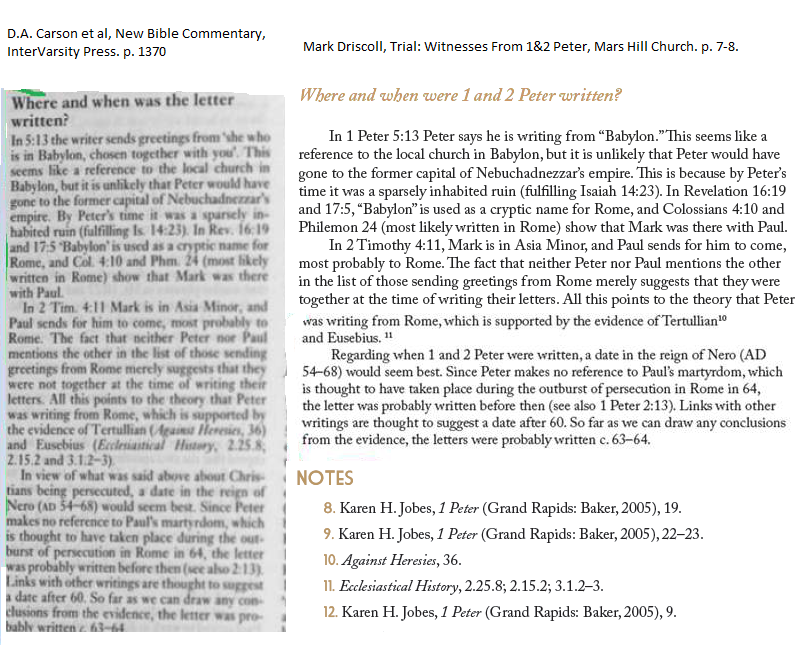On January 9, I compared a section of Mark & Grace Driscoll’s book Real Marriage to Justin & Lindsey Holcomb’s book Rid of My Disgrace. In that post, I noted that the Driscolls did not give adequate credit to the Holcombs for some material adapted from the Holcombs’ book on recovery from sexual assault. While some supporters of Mark Driscoll have minimized concerns about plagiarism and inadequate citation, the publishers involved apparently consider the problems to be important. First, Thomas Nelson added an acknowledgment to Dan Allender* in Real Marriage and now the publisher has made more changes in the book to more appropriately cite the Holcombs’ work.
The image below shows the original version compared to the Google version (p. 125) now online:
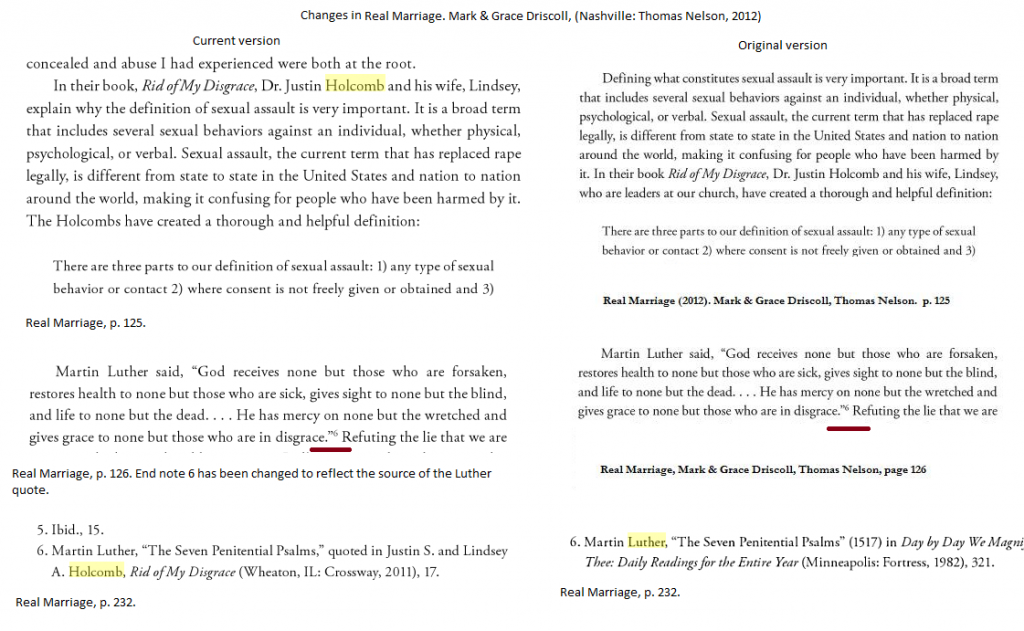
With these corrections, Thomas Nelson addressed the precise issues that I pointed out in the January 9 post. The current version is much better and gives appropriate credit to the Holcombs.
Thomas Nelson should get some credit for this reaction to concerns over plagiarism. In contrast to Tyndale House, Thomas Nelson apparently viewed the citation of the Holcomb’s work as less than market standards. Recall that Thomas Nelson pulled David Barton’s book, The Jefferson Lies when it became clear that the book was filled with factual errors. Now, they have taken a less drastic course but nonetheless tacitly acknowledged problems which require action.
I would say that the several publishers involved have a lot more work to do to make appropriate corrections. Now that Thomas Nelson has moved to make these changes, Tyndale House may feel additional pressure to rethink the findings of their investigation regarding citation of Peter Jones’ work in A Call To Resurgence.
*This now shows up in the Google version as well.
UPDATE: Thomas Nelson issued a statement to me today regarding the changes being made to Real Marriage. Click the link to read the statement.
Tag: Justin Holcomb
Mark and Grace Driscoll's Real Marriage Compared to Justin and Lindsey Holcomb's Rid of My Disgrace
Near the end of December, Becky Garrison wrote a piece in Religion Dispatches about the Mark Driscoll plagiarism controversy. In her piece, she referred to a book by Justin and Lindsey Holcomb titled Rid of My Disgrace:
And again, portions of Rid of My Disgrace (2011, Re:Lit), penned by Justin and Lindsey Holcomb, can be found in this book. (Chapter 7 of Real Marriage, contains unattributed passages from pages 16-17 and 27 of Rid of My Disgrace). In an ironic twist, the Resurgence store still sells this book even though Driscoll tried to blame Holcomb for the plagiarism found in the Trial book.
Yesterday, I noted that the Kindle version of Real Marriage has been slightly (but insufficiently) modified to mention the Driscoll’s use of Dan Allender’s work in The Wounded Heart. I wonder if the next Kindle correction will be a more adequate reflection of the debt the Driscolls owe to the Holcombs.
This case is an interesting one in that Real Marriage mentions the Holcombs many times. The Holcombs are mentioned in the Acknowledgments and their book is cited in the end notes. However, this situation demonstrates how an author can cite a source and still not give adequate credit. As I will show, Real Marriage needs to be corrected to properly and completely cite Rid of My Disgrace.
Probably the best way to do this is to provide a passage from Real Marriage followed by the source material from Rid of My Disgrace.
From page 125 in Real Marriage:
 Page 27 in Rid of My Disgrace:
Page 27 in Rid of My Disgrace:
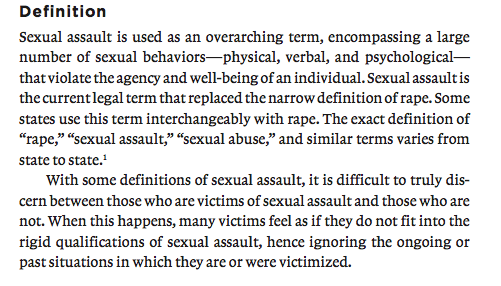
Here the Driscolls quote the Holcombs after they reword the section from the Holcomb’s book on definition of sexual assault. Note that the Holcombs footnote this section since they are reporting information and facts they gleaned elsewhere. The Driscolls simply rework material from the Holcomb’s book without attribution.
On page 126 of Real Marriage, the Driscolls cite Martin Luther:
 The footnote #6 in the text does not go to the Holcomb’s book but instead to the original Martin Luther source, implying that the Driscolls located the quote.
The footnote #6 in the text does not go to the Holcomb’s book but instead to the original Martin Luther source, implying that the Driscolls located the quote.
The source of the Luther quote appears to be from page 17 of Rid of My Disgrace:
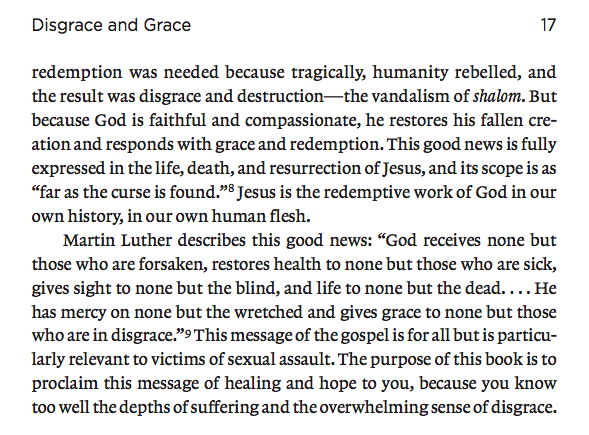
This is the same quote and it is hard to escape the suspicion that the Driscolls did not find the Luther quote independently but rather lifted it from Rid of My Disgrace. One can see from the footnotes that the source is the same. Note that the Holcombs appropriately cite the source where they found the quote.
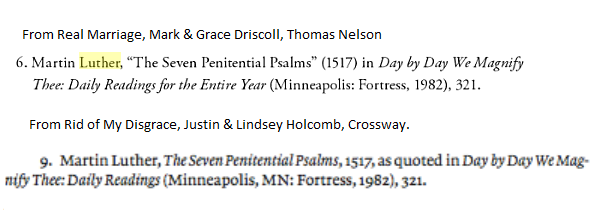
Let me hasten to add that it is clear that the Driscolls appreciate the Holcomb’s work. The Holcombs are thanked in the Acknowledgments and they are quoted with appropriate citations in the same chapter where they are not cited adequately. Given that the Holcomb’s book is sold by Mars Hill, they probably want people to buy it. Nonetheless, even though this may not have been intentional plagiarism, it is a matter that should be corrected by the publisher.
Given the scope of the issues I’ve reported here and in other posts, I think it is time for a more robust statement from Driscoll, Mars Hill and, in this case, Thomas Nelson. There appears to be a pattern. It may not be intentional. Not having Driscoll’s purported “gift of discernment,” I have no way to divine his motives. However, passing off other’s people work as your own is a serious matter and should be more seriously addressed.
For all posts on Driscoll and Mars Hill, click here.
Mars Hill’s Sermon Series Document Reveals Background of Mark Driscoll’s Book on Peter, Part Two
On Tuesday, I discussed a document found on The Resurgence website which contained the research notes behind Mark Driscoll’s book on the apostle Peter. That document was missing for awhile but now has been returned to the website (seems to be gone from the website again, here it is). In that post, I examined paragraphs from the NBC, Driscoll’s book and Justin Holcomb’s research notes. In this post, I want to review three additional paragraphs in a similar manner. From both of these efforts, it appears to me that Holcomb’s work was adequately documented. One problem I found was that one of the endnotes cited the wrong source which is an easy mistake to make. However, it seems clear to me from the use of quotes and citations that Holcomb was not presenting the information as his own work.
Furthermore, it appears to me that Rev. Driscoll (or someone on his behalf) took Dr. Holcomb’s research notes and included them nearly verbatim into Trial: 8 Witnesses From 1 & 2 Peter. As a result, the material originally from the New Bible Commentary — as stated by Intervarsity Press — “improperly appeared without quotation or attribution” in Driscoll’s finished product. As I see it, the material may have ended up in the Driscoll book via mistake by Driscoll or his staff. However, if I am accurate in my analysis, another question arises: Was is proper for Driscoll to take material from a research assistant, remove the quotations and citations provided by that research assistant and then portray that work and research as his own work? While I may be wrong in my analysis, until Driscoll explains how the material from Holcomb’s research appeared in his book, one is left to speculate based on the available evidence.
First, examine paragraphs from Holcomb’s notes on page 149:
Where and when was the letter written?
“In 5:13 the writer sends greetings from ‘she who is in Babylon, chosen together with you‘. This seems like a reference to the local church in Babylon, but it is unlikely that Peter would have gone to the former capital of Nebuchadnezzar‘s empire. By Peter‘s time it was a sparsely inhabited ruin (fulfilling Is. 14:23). In Rev. 16:19 and 17:5 ‘Babylon‘ is used as a cryptic name for Rome, and Col. 4:10 and Phm. 24 (most likely written in Rome) show that Mark was there with Paul. In 2 Tim. 4:11, Mark is in Asia Minor, and Paul sends for him to come, most probably to Rome. The fact that neither Peter nor Paul mentions the other in the list of those sending greetings from Rome merely suggests that they were not together at the time of writing their letters. All this points to the theory that Peter was writing from Rome, which is supported by the evidence of Tertullian (Against Heresies, 36) and Eusebius (Ecclesiastical History, 2.25.8; 2.15.2 and 3.1.2–3).
In view of what was said above about Christians being persecuted, a date in the reign of Nero (AD 54–68) would seem best. Since Peter makes no reference to Paul‘s martyrdom, which is thought to have taken place during the out-burst of persecution in Rome in 64, the letter was probably written before then (see also 2:13). Links with other writings are thought to suggest a date after 60. So far as we can draw any conclusions from the evidence, the letter was probably written c. 63–64.
Note the quotes at the beginning of this section. Immediately below is a screen capture of the beginning (p. 149) and end of the section in question (p. 150) from Holcomb’s research notes. The quotes are enclosed in red.
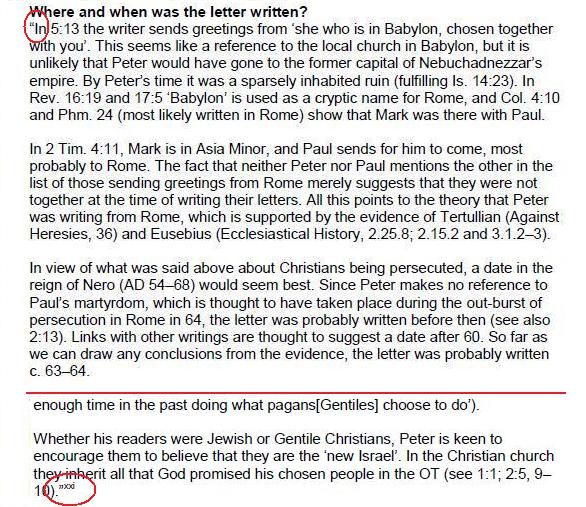 At the end of the passage, along with the closing of the quote, the superscript “xxi” is provided and leads to this correct reference information:
At the end of the passage, along with the closing of the quote, the superscript “xxi” is provided and leads to this correct reference information:
David Wheaton, ―1 Peter in New Bible Commentary: 21st Century Edition, Ed. D. A. Carson, 4th ed. (Downers Grove, Ill.: Inter-Varsity Press, 1994).
In the book Trial: 8 Witnesses From 1 & 2 Peter, Driscoll did not use all of what Holcomb provided but did incorporate some of it nearly verbatim. Also, note that the research notes do not paraphrase the Bible commentary but include the passage verbatim within the quotations. At this link you can see the entire section uncut, thus demonstrating that the section was set off by quotes with correct citation to the chapter on Peter in the NBC.
Now compare the passage above with the original chapter in the NBC and as included in the book by Driscoll.
In this section, Driscoll (or someone) removed the quotes from the research notes, changed a few words and included the material in his book without the citation. He did, however, include the references to Against Heresies and Ecclesiastical History as footnotes. The appearance is that Rev. Driscoll consulted those sources directly.
I am not going to speculate much more about what happened. I simply don’t know what was behind the decision to include this material as it is. However, I don’t believe Holcomb as research assistant should be the focus of this matter as was implied in the statement made by Mars Hill Church on their website. The ball is in Driscoll’s court to address the questions about proper use of a research assistants’ work when there is no credit given.
For me, the issue of ghostwriting and use of research assistance is a prime topic we should be talking about. I am with John Piper on this. Putting one’s name on material one did not write is misleading and corrosive to trust among consumers of published materials. It seems to me that the Christian publishing industry, authors, ministers and other stakeholders should engage in reflection about this practice. One good thing that I hope emerges from this controversy is a new standard that discourages ghostwriting and provides guidelines for the proper and honest attribution of authorship.
Another issue of concern relates to the statement from Mars Hill Church about “citation errors” in the book on 1 & 2 Peter. Their altered statement (you can read the original and altered statements here) suggests that the problems with the book on Peter were due to a “team of people, including a research assistant.” However, now it appears from this information on their own website that the issue was not the Docent researcher but whoever took the researcher’s work and put Mark Driscoll’s name on it.
